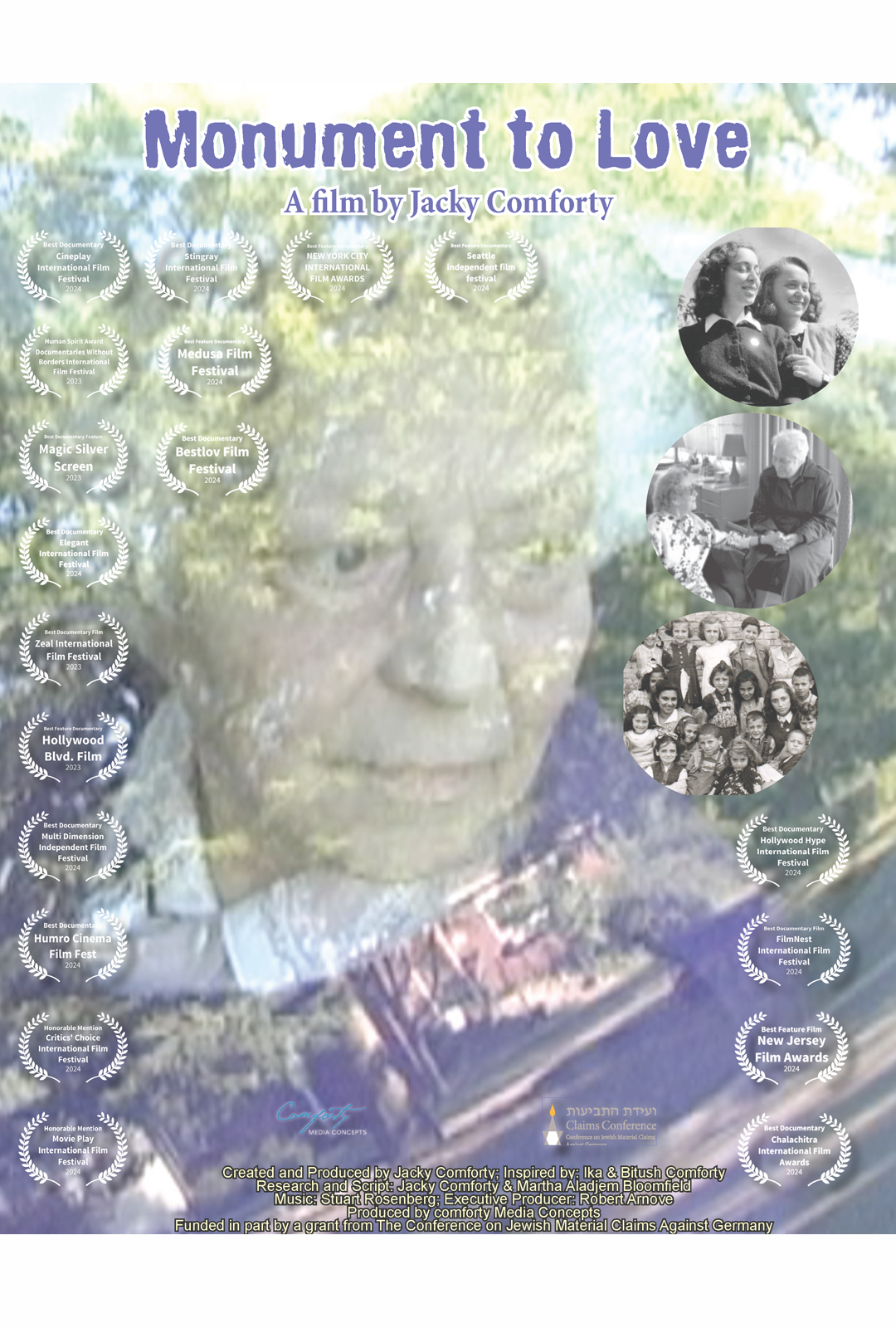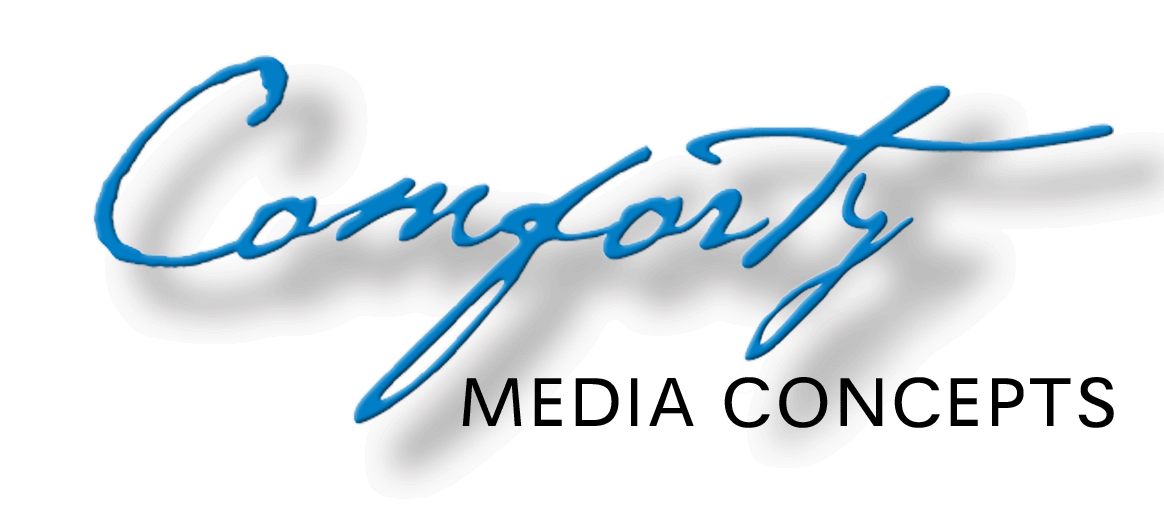Monument to Love
“Monument to Love,” Best documentary at over fifty international film festivals.
The film features a journey with my mother, Ika Comforty Ovadia, for over 25 years to research, document, and uncover the narrative of the Jewish people during the Holocaust in Bulgaria. As our journey progressed, Ika’s personal story unfolded. She shared memories and read passages from her diary which revealed her observations, thoughts and feelings, as a young woman, facing a broken world, plunging into war. Kind acts of friendship she experienced contrast the cruel times and the dangers she and others escaped. Ika’s story is an anti-war manifesto, confronting totalitarianism and supremacy, and erecting a Monument to Love.
Jacky Comforty is an award-winning documentary filmmaker whose groundbreaking films have been shot in the United States, Germany, Israel, and Bulgaria. With decades of experience in independent film production focusing on both models of inclusive education and Holocaust Studies, he has developed a multidisciplinary, multicultural, and multilingual approach to collecting oral histories and creating meaningful projects, placing emphasis on nonintrusive, non-scripted methodologies for documentation.
His credits include: Balkan Jazz, (April 2024), Monument to Love, 2023, The Optimists (2001), In the Shadow of Memory (1998), Through a Glass, Lightly (1996), Step by STep: Heather’s Story (1995) . Among numerous other distinctions, Comforty has received the Berlin Festival Peace Prize, the Jerusalem Film Festival’s Jewish Experience Award, 3 CINE Golden Eagle awards, the American Association of Museums MUSE award, and the Chicago International Gold Hugo Award.
Some thirty-five years ago, I became interested in Bulgarian Jews, and the Holocaust. At that time, I was a young scriptwriter and director of comedy. I was close with my parents who were Bulgarian Jewish immigrants in Israel and supported my artistic aspirations. They once told me that, “There is one story you must tell, which is how we were saved during the Holocaust.” I had never heard the story before and at the time recorded this conversation on an audio-cassette tape.
The conversation with my parents began the process of learning, researching, interviewing and creating multiple documentation projects about the Holocaust and its effect all over Europe, and paricularly in Bulgaria. Over the years, I conducted about 250 oral histories which I used to produce four full-length documentaries and a dozen short movies. “Monument to Love ” is a result of 35 years of collection and documentation. The richness of the story and the depth of the work are clearly visible in the film.
When I started to explore our heritage, the common notion was that there was no Holocaust in Bulgaria and that our people were saved. I interviewed hundreds of people, documented places and events, and collected archival films and photos. The story became more complex, and sometimes darker. I set out to document how they were saved. Yet, the stories people told were of resilience, resistance and survival and of friendships and kindness among common people, that were stronger than fascism, propaganda and hatred.
My mom was very supportive and active from the start. She collected photos and took notes for me, researched bibliography and documents, and provided a personal context. She joined me on two trips to Bulgaria in 1990 and in 1999. At first, I wanted to hear mostly about historical events. Her role as witness was marginal. Over the years we kept exploring other aspects of her story and our mutual interest in the education of young children.
At some late stage of our journey she even found her lost diary that provided a timely perspective. It took 30 year to film and tell this story. Through sharing voices and memories of those who survived the times we construct a panorama of personal history, thoughts and diary entries, in response to the events of the time. We always were close, but the process of learning and our dialogue throughout the journey brought us closer, and helped us capture the essence of the story orally and the passing it on.
Opening statements from Ika:
“Love is the greatest force in the world. It is stronger than religion, It is stronger than anything. If you love, you do. If you do not love, nothing will happen. With love, children are raised, with love, a bond is formed between two people. With love, we become parents to children. With love, we become teachers and students. With love, children are raised, with love, a bond is formed between two people. When you love something, you work all your life and give. You do not give? There is no life, no beauty. Without love, nothing happens. Period.”
Synopsis:
Monument to Love is my new film depicting a journey I took with my mom Ika Comforty Ovadia for over 25 years to research, document, uncover and tell the narrative of the Jewish people and what they experienced during the Holocaust in Bulgaria.
We collected photos and documents, tracked people, and visited places in Bulgaria to discover untold stories. They defied common perceptions and highlighted the struggle of the Jews to resist and to mobilize help from righteous Bulgarians from all walks of life to help them survive. Acts of friendship and kindness contrast the harshness and cruelty of the times and the dangers that the survivors escaped. Sweet memories were mixed with trauma and raised questions about the past—stories we know and those which remain hidden from our site.
As the years were passing, and our journey progressed, more and more details were unfolding about Ika’s wartime experiences. Her story reveals her world as a young woman, writing and reflecting in her diary about the deteriorating news of her time, as the world was plunging into war. Her memories and diary are a lasting anti-war and anti-totalitarianism manifesto and a spirited confrontation with the ideology of supremacy. Join me and my mom on this journey as she reconstructs the past and erects a Monument to Love and Friendship.
Opening statements from Ika:
“Love is the greatest force in the world. It is stronger than religion, It is stronger than anything. If you love, you do. If you do not love, nothing will happen. With love, children are raised, with love, a bond is formed between two people. With love, we become parents to children. With love, we become teachers and students. With love, children are raised, with love, a bond is formed between two people. When you love something, you work all your life and give. You do not give? There is no life, no beauty. Without love, nothing happens. Period.”
Director’s Statement
Some thirty-five years ago, I became interested in Bulgarian Jews, and the Holocaust. At that time, I was a young scriptwriter and director of comedy. I was close with my parents who were Bulgarian Jewish immigrants in Israel and supported my artistic aspirations. They once told me that, “There is one story you must tell, which is how we were saved during the Holocaust.” I had never heard the story before and at the time recorded this conversation on an audio-cassette tape.
The conversation with my parents began the process of learning, researching, interviewing and creating multiple documentation projects about the Holocaust and its effect all over Europe, and paricularly in Bulgaria. Over the years, I conducted about 250 oral histories which I used to produce four full-length documentaries and a dozen short movies. “Monument to Love ” is a result of 35 years of collection and documentation. The richness of the story and the depth of the work are clearly visible in the film.
When I started to explore our heritage, the common notion was that there was no Holocaust in Bulgaria and that our people were saved. I interviewed hundreds of people, documented places and events, and collected archival films and photos. The story became more complex, and sometimes darker. I set out to document how they were saved. Yet, the stories people told were of resilience, resistance and survival and of friendships and kindness among common people, that were stronger than fascism, propaganda and hatred.
My mom was very supportive and active from the start. She collected photos and took notes for me, researched bibliography and documents, and provided a personal context. She joined me on two trips to Bulgaria in 1990 and in 1999. At first, I wanted to hear mostly about historical events. Her role as witness was marginal. Over the years we kept exploring other aspects of her story and our mutual interest in the education of young children.
At some late stage of our journey she even found her lost diary that provided a timely perspective. It took 30 years to film and tell this story. Through sharing voices and memories of those who survived the times, we construct a panorama of personal history, thoughts and diary entries, in response to the events of the time. We always were close, but the process of learning and our dialogue throughout the journey brought us closer, and helped us capture the essence of the story orally and the passing it on.

The film was funded by a grant from the Claims Conference

